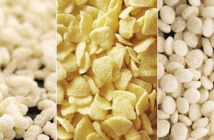 Gelatine, collagen and collagen peptides are natural ingredients, and that is why pure natural products manufacturer GELITA AG attaches great importance to the responsible use of natural resources.
Gelatine, collagen and collagen peptides are natural ingredients, and that is why pure natural products manufacturer GELITA AG attaches great importance to the responsible use of natural resources.
The German giant – which last year achieved a turnover of $1153m – has recently produced its second sustainability report in its goal to combine economic success with ecological and social responsibility. “We are highly committed to the environment, and sustainable action is deeply rooted in our corporate philosophy,” chief executive Dr Franz Josef Konert says. The company is the world’s foremost innovator and producer of collagen proteins, with 21 plants spread across all five continents. Its collagen proteins are used as gelatins in food and pharmaceutical products, and the company invests in new energy-saving technologies and improved production processes on a regular basis. Some measures in the report include the recovery of water from production, the use of electricity from renewable energy sources, and the utilisation of residues from gelatine production as compost.
It also presents the development of some important key figures – for example, despite an increase in production volume, the energy consumption, quantity of fresh water used, wastewater volume and emissions such as the greenhouse gas carbon dioxide (CO2) have all reduced. GELITA marketing and communication head Michael Teppner says in addition to the continuous improvement of production processes, the company also focuses on the development of innovative products. “The quality of our products also helps to conserve natural resources, such as when they are used in fertilisers or detergents, and they contribute to health and well-being.” When processing animal raw materials (by-products of meat production such as cattle hide or pig skin) for gelatine and collagen peptides, the issue of fats, functional proteins and minerals also arise.
GELITA has developed complex processes to produce quality products from these materials – fertiliser, animal feed or biofuels, for example. “Our modern manufacturing processes mean that the raw materials are almost completely utilised in a sustainable and efficient way,” Teppner says. Sustainable economic management also includes dealing with employees in the right way. Occupational health and safety are top priorities at the company, such as improving work processes or investing in safe facilities.
The company has a continual decline in the number of work-related accidents at its sites, despite an increase in the number of employees globally. Social commitment does not end at the factory gate: in 2016, the company supported 96 projects worldwide, ranging from sporting events and aid for socially disadvantaged people to educating young people. The commitment includes cooperation with schools and study trips or music lessons for talented children and youngsters. “Sustainable commitment at GELITA, however, means more than just material support. Our employees themselves get actively involved in providing help”, Teppner says. www.gelita.com





























































































